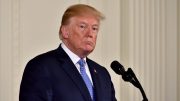The US-China trade war has already seen various skirmishes, around intellectual property, steel and soya. One, however, is shaping up to be a battleground that could define a new world order – by taking control of the global innovation highway, writes John Egan.
Innovation is making information valuable. It sits at the source of the creation of value, quality of life and prosperity, as well as the occasional destruction of much of the same.
If one wants to master innovation, as far as one can, a control of the infrastructures that make it possible is a good place to start. So, the leading role of the Chinese company Huawei in the emerging 5G mobile internet is being seen as a serious threat to a world order based on a dominant United States – a domination also largely derived from its historical technological prowess.
“We choose to go to the moon in this decade and do the other things, not because they are easy, but because they are hard”, President John Kennedy famously said in an address at Rice University in 1962.
In a replay of the domination afforded the British as fruits of their outstanding advances during the 19th century’s industrial revolution – when competing nations first learned the lessons of industrial development and leap-frogged each other along the road to progress – China has been doing the same with strategic investments in digital technology and infrastructure.
The case of Huawei has been pushed to the surface by the recent tightening of trading conditions between the United States and China – and it demonstrates that the US is not in the best shape to pick a fight.
Technological capability is important as it is the product of a wealth of engineering excellence that has been developed in China in close association with the strategic plans of the ruling Chinese communist party.
5G mobile telephone systems will be rolled out widely from 2020 with a step change in capability to download huge amounts of data very quickly. A full feature-length film will be downloaded in a matter of seconds. No less important is the diversity of smart devices such as autonomous vehicles and a world of the Internet of Things that will be permanently connected and talking to each other.

Smart cities will connect through future generations of mobile networks
Such a massive increase in data transfer requires a new architecture of specialised base stations (antenna) which relay information into a core network very rapidly. As of January this year, Huawei had won 30 commercial 5G contracts and shipped over 25,000 5G base stations globally, according to company statements. It is the tip of a very large iceberg. Also, last month, the company launched the first chip specifically designed for 5G base stations along with “all-scenario” artificial intelligence technologies to maximise network autonomy, efficiency and performance. This smart infrastructure is a source of major security concerns.
This technological capability is important as it is the product of a wealth of engineering excellence that has been developed in China in close association with the strategic plans of the ruling Chinese Communist Party.
Big business in China is tightly pinned onto the political landscape in a manner reminiscent of the American industrial-military complex that drove many technology advances during the cold war. Tencent and Alibaba in China can match the GAFA giants in the US for size, capability and reach.
To cement this relationship a law was passed in 2017 in China legislating on the scope of national agencies to collect and process relevant intelligence on foreign bodies, organisations and individuals. Article 7 of this law stipulates: “An organisation or citizen shall support, assist in and co-operate in national intelligence work in accordance with the law and keep confidential the national intelligence work that it or he knows”.
As reported by the BBC, Ren Zhengfei, the founder and president of Huawei, emphasised last month that no Chinese laws imposed the installation of “backdoors” into the equipment of his company, to enable intelligence services to monitor the passing data. He added: “I personally would never harm the interest of my customers and me and my company would not answer to such requests”.
Article 7 of the National Intelligence Law might be expected to forbid any other response. Although Huawei claim this is not the case, many remain unconvinced.
Such concerns have pushed US President Donald Trump to lean heavily on the nation’s allies, warning of the security risks posed by use of Huawei equipment. The company has been excluded from bidding for some 5G network contracts in the US, Australia and New Zealand and it looks likely the United Kingdom, Japan and Canada will follow suit. Germany announced its own enquiry into the security threat posed by Huawei on February 8. Huawei’s overseas investments have also been questioned. In the UK, for example, the University of Oxford recently said it would decline any future collaborative ventures with the company.
UPDATE: Huawei risk can be managed, say UK cyber-security chiefs
Any risk posed by involving the Chinese technology giant Huawei in UK telecoms projects can be managed, cyber-security chiefs have determined. The UK’s National Cyber Security Centre’s decision undermines US efforts to persuade its allies to ban the firm from 5G communications networks. The Chinese government is accused of using Huawei as a proxy so it can spy on rival nations. But Huawei has said it gives nothing to Beijing, aside from taxes. Australia and New Zealand have blocked or banned Huawei from supplying equipment for their future fifth-generation mobile broadband networks. The US has restricted federal funding to buy Huawei equipment, while Canada is reviewing whether the company’s products present a serious security threat. BBC news, February 18
As a result of these concerns about the security of 5G networks, the short-term future for Huawei appears to have dimmed. As reported in the Financial Times, Ren Zhengfei said in an email to staff that, “In the coming years, the overall situation will probably not be as bright as imagined, we have to prepare for times of hardship”.
The next developments are likely to take place around the Mobile World Congress in Barcelona at the end of February.
Huawei has been excluded from bidding for some 5G network contracts in the US, Australia and New Zealand and it looks likely the United Kingdom, Japan and Canada will follow suit.
In the UK, in a letter sent to parliament’s Commons Science and Technology committee in late-January, Huawei said that it was preparing to invest $2 billion to address the security concerns that have been raised, but that it could take at least three to five years to re-engineer their complex systems.
This delay presents a quandary for both governments and telecoms companies. Being first to market with 5G capabilities will clearly be a major competitive advantage for companies and the route to do this is arguably through the deployment of Huawei technology. Innovation within the important telecoms sector will be spurred by 5G technology, and investment and competitivity will suffer if there is a long delay in its implementation.
This is where China and Huawei hold the cards in the geostrategic game the US administration has embarked upon. They now have the high competence and capacity to supply state-of-the-art technology for which export markets are hungry. Along with other infrastructure projects, such as the Silk Road Economic Belt initiative and the CCRC rail transport enterprise, China is expanding its trading network and the connected counties will be eager for the development opportunities Chinese innovative technologies present.
Elsewhere, the US administration is obsessed by building a largely pointless wall and the UK, France and Italy, among other European countries, are locked in local disputes in an energy-sapping struggle to hold together their weakened democracies. Complacent and distracted, and lacking vital expertise, they are diluting their capacity to innovate and their discontented middle classes are loosening their hold on the privileged place they cherish in the world.
In the era of the digital revolution, innovation – making information valuable – is the new game in town and China, and its partners, have the wherewithal to flourish.

Headline Photo Credit: metamorworks/Shutterstock.com
Smart city graphic: monicaodo/Shutterstock.com




